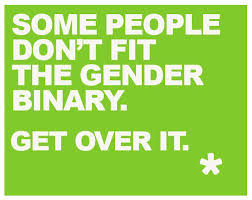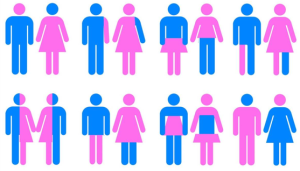How do we determine gender? Gender has the ability to be performed in a variety of ways, but is continuously reflected as the typical “girl” versus “boy” associations. Gender performativity, a very broad term, describes the way in which one portrays their gender identity, either fitting the norms of male or female or defining new norms. The idea, formed by Judith Butler is made on account that gender is not something someone is initially born with. Gender is assigned according to sex, males from the time of birth are expected to perform masculine characteristics while females portray feminine characteristic. We need to be able to look at gender as more than the performance of gender roles and see gender as a continuously changing subject that cannot be set as soley two different ideals.

The big question is why is gender only separated into two categories of male and female, through portraying masculine and feminine behaviours? Is it possible for gender to not only be a reflection of sex?
Today we look at gender as two set concepts of male and female. In many cases these norms are bent to form new gender formations. Through encouragement for diversity of Canadian and other Western societies, it is surprising that we still see the lack of acceptance towards those willing to bend the gender norms and portray their true selves. An article titled, Understanding Gender, describes this as gender expansion, when individualism is created through the stretching of the set gender definitions (Understanding Gender).

Fixed genders are not a fair description of today’s societal roles. Non-binary roles, in which someone does not portray particularly female nor male gender roles are seen today. This concept of non-binary gender roles is important to consider as we can see gender simply as a concept rather than a set rule. “Their Story: ‘I want to be somewhere between two fixed gender points'” is an example of adolescents who do not portray a simplistic standardized gender. When looking at a young adolescent Mx. Gilmer-Osborne, they describe their gender situation as merely a transition period in which one can keep an open mind towards opportunities within life (Their Story).
Taking away the gender specific concepts as portrayed through the eyes of Mx. Gilmer-Osborne, one provides themselves with a new light to look at the world. This allows one to live with no restrictions in which society has created based on gender norms. This is not a battle specifically of gender, this is a battle of individualism. There needs to be a focus on what and how an individual wants to be portrayed.
There are many activists supporting individualism rather than focussing on defining factors. Tyler Ford and iO Tillet Wright, as examples, actively engage in the rights not only of gender performativity but the importance of one feeling comfortable in their own skin while being the person who they want to be, receiving the rights they deserve. iO shows that rather than being placed into one of few ‘boxes’ created by society of who you should be, one should be an individual performing who they are not based on their gender but how they feel. iO shows the importance of forgetting these gender norms as well as sexuality as a defining factor and focusing on who one wants to be specifically as an individual.
Gender needs to be conveyed as a form of expression rather than a set definition. Taking away the negative connotations towards gender expansion and non-binary genders will

allow for societies to focus on individualism. Gender should not be seen as a set definition but rather a form of expression that can be displayed in a variety of ways. The focus of male versus female retracts individualism from those who are bending the social norms due to the lack of social support. Expansion of gender identity, not as a definition, but as a form of expression takes away the set rules of gender associated with sex at birth, allowing for one to focus on life open to change. Although this will benefit individualism according to gender within society, how can we change the negative connotations embedded into societies minds?